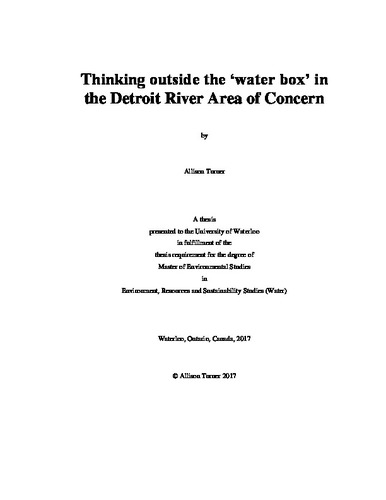| dc.contributor.author | Turner, Allison | |
| dc.date.accessioned | 2017-08-30 15:34:44 (GMT) | |
| dc.date.available | 2017-08-30 15:34:44 (GMT) | |
| dc.date.issued | 2017-08-30 | |
| dc.date.submitted | 2017-08-24 | |
| dc.identifier.uri | http://hdl.handle.net/10012/12273 | |
| dc.description.abstract | Despite sustained attention to water issues around the world—including attention to shortcomings in water governance—many long-standing water problems persist around the world. This may be because some of the sources or causes of water problems are external to the water sector. Water governance often is based on water-centric problem framings that do not take sufficient account of the role of external actors, institutions, and drivers. Recognition of this problem is growing, but identifying external connections and then addressing the critical ones is challenging for water managers.
This thesis tests a flexible diagnostic process that can be used by researchers and practitioners to identify external connections and evaluate their importance in specific water governance settings. The case study for this research is the Detroit River Area of Concern (AOC), located in both the United States and Canada. The river is important and used extensively by both humans and wildlife; as a result of the human uses, the Detroit River was listed as an Area of Concern. The objectives of this research include (1) applying a diagnostic approach to the Detroit River AOC to determine whether or not external connections are affecting progress on the Detroit River Area of Concern, and if so, what external connections are most relevant and important to address; and (2) proposing response strategies and actions for improving governance in the Detroit River Area of Concern and beyond. This research uses a “two-case” multiple case study research design, triangulating data gathered from 28 key informant interviews, review of 58 documents, and personal observations.
The findings of this study reveal that the Detroit River AOC was carefully and purposefully designed in a water-centric manner, in order to more easily manage the complexity of cleaning legacy pollution. As a result of this water-centric framing, people working on the Detroit River AOC have completed numerous high-profile projects on the river, and the river should qualify for delisting as an Area of Concern without having to address external connections. That being said, a water-centric perspective has caused challenges in the AOC, and these challenges illustrate that efforts should be made to engage external drivers, institutions, and actors in parallel to or after AOC delisting. Key external connections include global environmental changes such as climate change and the introduction of invasive species, the health of adjacent waterways, population and land use change, and changing incentives in the form of funding, regulations, and public perception. Practitioners have several options for addressing external connections both during and after delisting; these include thinking more proactively about “life after delisting” through a comprehensive visioning exercise, connecting with existing initiatives and networks in the area with the help of “boundary spanners,” strengthening binational ties, and clarifying the role of an Area of Concern.
Ultimately, this thesis contributes to furthering our understanding of external connections in water governance, with special focus on the Great Lakes Area of Concern program. | en |
| dc.language.iso | en | en |
| dc.publisher | University of Waterloo | en |
| dc.subject | water | en |
| dc.subject | water governance | en |
| dc.subject | Detroit River | en |
| dc.subject | Areas of Concern | en |
| dc.subject | Great Lakes | en |
| dc.subject | Detroit River Area of Concern | en |
| dc.subject | governance | en |
| dc.subject.lcsh | water quality management | en |
| dc.subject.lcsh | water resources development | en |
| dc.subject.lcsh | Michigan | en |
| dc.subject.lcsh | Ontario | en |
| dc.subject.lcsh | Detroit River (Mich. and Ont.) | en |
| dc.subject.lcsh | Great Lakes (North America) | en |
| dc.title | Thinking outside the 'water box' in the Detroit River Area of Concern | en |
| dc.type | Master Thesis | en |
| dc.pending | false | |
| uws-etd.degree.department | School of Environment, Resources and Sustainability | en |
| uws-etd.degree.discipline | Environment, Resources and Sustainability Studies (Water) | en |
| uws-etd.degree.grantor | University of Waterloo | en |
| uws-etd.degree | Master of Environmental Studies | en |
| uws.contributor.advisor | De Loë, Robert | |
| uws.contributor.affiliation1 | Faculty of Environment | en |
| uws.published.city | Waterloo | en |
| uws.published.country | Canada | en |
| uws.published.province | Ontario | en |
| uws.typeOfResource | Text | en |
| uws.peerReviewStatus | Unreviewed | en |
| uws.scholarLevel | Graduate | en |

